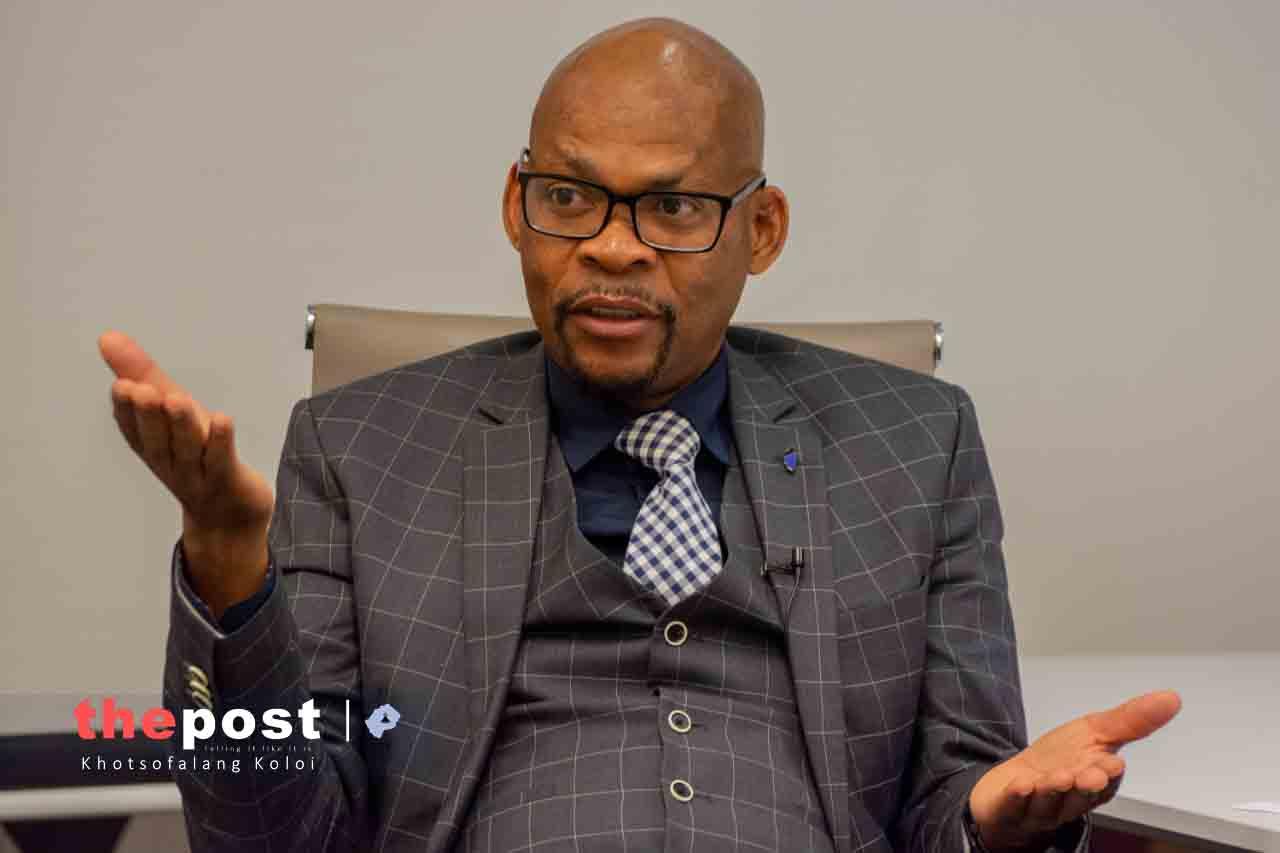Africa-Press – Lesotho. MOLEFI Leqhaoe finds himself behind the driving wheel of the only fully Basotho-owned bank, the Lesotho Post Bank, at a time when the banking industry is undergoing a radical shift.
The shift is driven by new competition from mobile money platforms, changing business models, and disruptive technologies among others. Leqhaoe does not only have to keep an eye on the business but also to guard it against politicians’ interference since the bank wholly belongs to the government.
Our business reporter, Refiloe Mpobole, spoke to Leqhaoe about these subjects. Below are excerpts from the interview. As you know very well that most government-owned institutions often do not succeed, were you not afraid when you joined the bank, fearing that you would fall in the same pit?
My team and I are here to take challenges. This is what keeps us going. When you look at the history of Lesotho banking, most of those banks failed because of poor corporate governance.
This is what kills most of the organisations, especially banks. That is why we need to be on top of our game. When we came in as new management, we wanted to initiate some changes and demonstrate to Basotho that Basotho are capable of running big institutions.
This is also being portrayed through our engagement in several countries where we advise on good corporate governance. We have to ensure that our potential customers are given a fair treatment in whatever they want us to do as the bank.
What safeguards have you put in place to ensure that you don’t go where these other banks went? Look at why those banks failed. The major factor was politicians’ interference with their operations and they gave them loans they didn’t qualify for.
In most cases, they were not even paying back. We offer loans to people who qualify and those who don’t qualify we guide them so that they can qualify.
As corporate governance specialist, I know exactly what should happen. Most members of my team are highly qualified in different areas so that they can advise the management.
What kind of problems did you encounter which would have been a threat to the stability of the bank? How did you overcome them? First, there were no good corporate governance structures from executive up to the board.
We had to ensure that the executive committee has supporting structures such as financing committee and other committees. This is so critical because we take people with different skills which fit into the executive committee.
The sub-committees are helping the board to provide good oversight while the executive committee works on strategic issues. The operational committee is actually helping the executive committee to ensure that it provides strategic direction.
This was so difficult to do because before one can make changes, there should be a change management process and a detailed one where everyone will have to understand and cooperate.
We overcame them through applying some strategy engagement and also by allowing people to raise their views. We listen a lot to ensure that everyone who is part of the team cooperates.
Secondly, the business was driving itself which is also wrong because the business has to be driven by leadership. We did not have the sales force. However, we managed to set up the sales force with a lot of experience, serving different customers.
It was a long process before everybody could understand and feel that they were part of that initiative. But today I am glad that it is working. Thirdly, the core banking that we were using was too old.
This could not allow us to provide customers with needed products. We then changed our customers’ core banking to a modern one which allows us to have our customers’ needs in our systems.
During its operational period, the bank had accumulated losses of around M187 million from 2005 to 2013. In 2013, it had a loss of M10 million. After changing the management in 2014, we started making a profit of M4.9 million.
Before the new management even the salaries of the staff were paid by the government, after the new management, the salaries are now being paid by the Lesotho Post Bank.
From that time we have been growing gradually up until now when we are talking of M74 million audited profit. This is all about hard work, and knowing the fundamental problem.
Before the new management, the major challenge was fraud. There was a loan book of M23 million and M13 millions of it was fraudulent. Around M7 million was unpayable.
Looking at our financial statement we had M17 million profits thereafter. However, in the third year, we declined because we had to write off those debts.
We had to be prudent to ensure that our financial statements are corrected. From there we took the upward trend. We got the directive to stop charging certain people and that made a knock of M20 million.
However, we came with a different strategy altogether. Every day after getting the report from different departments, I have to make more strategies on which direction we should take.
This is because banking is very fast, it is very evolving, if we don’t take the right strategy when necessary, things change drastically. If you are working in the banking sector, your team has to understand their everyday responsibilities because things can change drastically.
Our balance sheet is now on M2 billion. Before the new management, the balance sheet was M297 million. Do you want to see yourselves becoming a player as an international bank?
This is what we are currently looking at. Recently I was in South Africa trying to see whether our bank cards can be used internationally. This initiative needs a lot of focus.
However, it is what we want to see happening this year. We also want to see the Lesotho Post Bank as a development bank. We are looking after the unbanked and the under-banked.
We are also looking at customers who can create economic activities. Looking at our mandate, this requires development. Right now we are looking at ensuring that Basotho who are working in South Africa are able to remit money to Lesotho.
We have seen that once we have done that, we will support our customers’ initiatives of getting money and transferring it into Lesotho. We are going to partner with other institutions abroad to remit money from South Africa to Lesotho.
What we can only do is to combine our system to see how we can integrate them. Operating in other countries will not be easy. We are also planning to remit money through our branch network more especially to SADC countries since we are part of SADC and I am sitting in the SADC board.
We are also looking at being the lead bank to ensure that money remittances become convenient and easy for Basotho. What have you put in place to cater for international remittances?
International remittances are an important factor in Lesotho. We also have a large group of Basotho working in South Africa. This is our major objective as a bank to ensure our customers can use our services at their convenience through our bank cards.
We are in the final stages with this one. However, it requires a huge infrastructure and money for its set-up. Around September this year, our bank cards will be operating everywhere.
The bank card is going to be the debit card which will allow customers to use them in every country. We are also working on introducing the credit card, once the process is complete, this will be open to every Mosotho.
There is stiff competition between the banks and mobile money platforms. What is the bank doing to meet the competition? Are you winning? We have a Khetsi product and our e-wallet.
Khetsi is the digital platform which deals with transferring money electronically. The only challenge we have now is to ensure that Khetsi penetrates every place in Lesotho.
Our mobile money and improved services have helped us in increasing our customer base from 23 000 to 140 000 currently. This says the technology we have implemented and the good governance has enabled us to attract more customers.
What we have realised is that Basotho like the Lesotho Post Bank and what is required from us is to love them back and try to understand their needs. We still remain the cheapest bank in Lesotho and we want to remain there.
For More News And Analysis About Lesotho Follow Africa-Press






